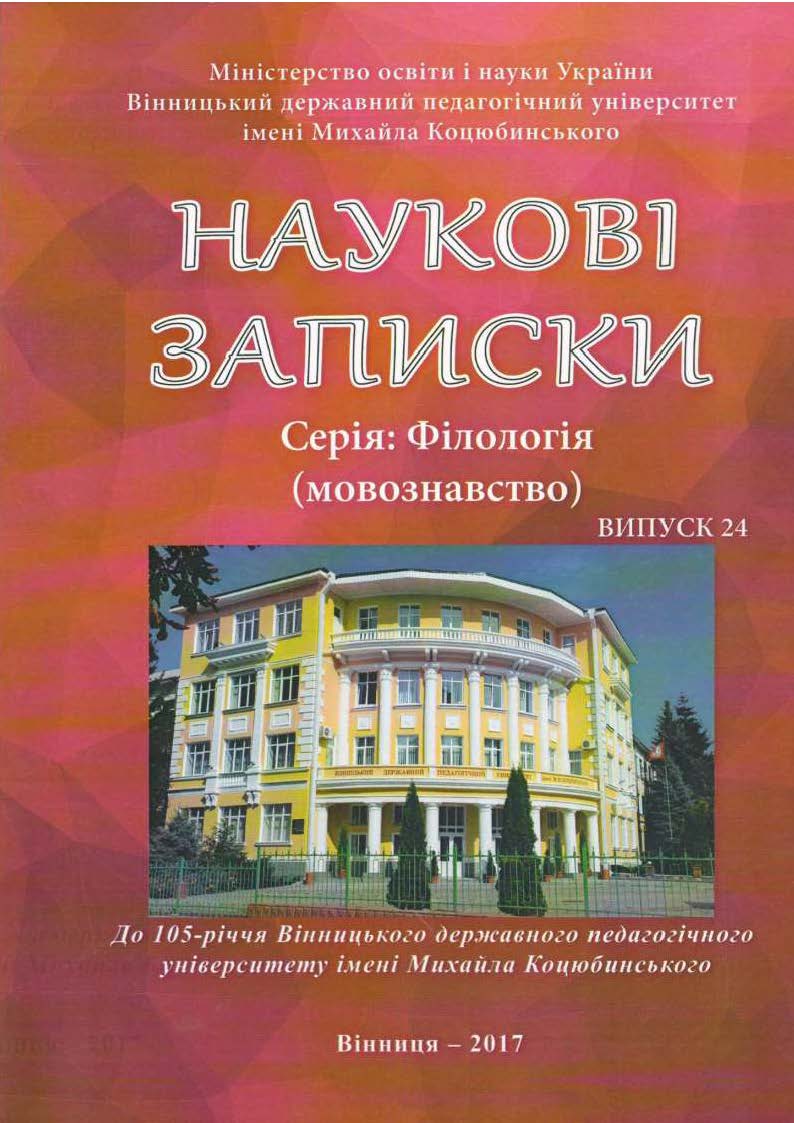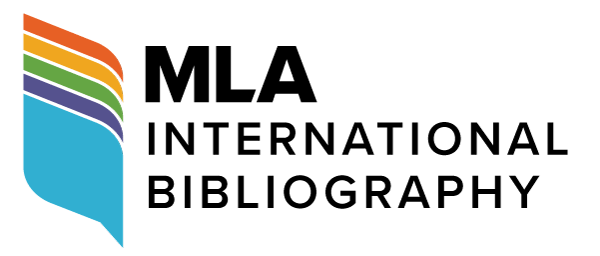Syntactic means of colloquial stylization in the works of Mykhailo Stelmakh
DOI:
https://doi.org/10.31652/2521-1307-2017-24-146-154Keywords:
transition, relative adjective, qualitative adjective, relatively-qualitative adjectives, lexical meaning, metaphorical epithet, Mykhailo StelmachAbstract
In the modern Ukrainian language the transition of relative adjectives to qualitative ones is one of productive ways of semantic enrichment and expansion of adjective’s functional capabilities. In a fiction text relatively qualitative adjectives are used as metaphorical epithets. So the aim of the research is to review how relatively qualitative adjectives participate in creating epithets in the Ukrainian classical literature, find out the peculiarities of their functioning in Mykhailo Stelmakh’s prose texts.
The source base of the research is formed with 5 Mykhailo Stelmakh’s prose texts: "Four Ways", "Thought of You", "Blood is Thicker than Water," "Geese-Swans Flying ...", "Christmas Eve" from which 217 syntactic constructions with relatively qualitative adjectives have been chosen by sampling method. The transition of relative adjectives in the category of qualitative takes place on the grounds of their figurative use, the relative adjective metaphor, which has the potential expression of some assessment in developing quality value when combined with another noun lexical series. A relative adjective has the ability to enter into new lexical relations, but transformation of relative adjectives into qualitative ones also depends on the capacity of a word-building noun. The more qualitative semems form lexical meaning of a word-building noun, the more qualitative lexical meanings can be developed by derivative relative adjective. 8 models creation of relatively-qualitative adjectives according to their acquired
metaphorical lexical meanings have been defined: relatively qualitative adjectives with the meaning of color, brightness, sound, smell, soft, static, weight and evaluative characteristic. The most frequent lexical model from this range is the color characteristic. This qualitative features is observed in relative adjectives, derived from names of metals, stones, plants, substances, materials
and physical phenomena. According to the degree of transition in the system of semantic adjectives groups, all
relatively qualitative adjectives have been classified into 2 categories: self relatively qualitative adjectives and contextual relatively qualitative adjectives, which differ in semantic and grammatical features. A peculiar way of expressing M. Stelmakh’s individual style is using relatively qualitative adjectives with occasional connotative lexical meaning such as metaphorical epithet.
References
Бибик С. П. Усна літературна мова в українській культурі повсякдення / С. П. Бибик. – Ніжин : Вид-во «Аспект-Поліграф», 2013. – 589 с.
Білодід І. К. Мовна щедрість художника (Мовно-стилістичні засоби творів М. П. Стельмаха) // Українська мова і література в школі. − 1972. − № 5. − С. 28–34.
Бойко М. Ф. Мовна майстерність прози M. Стельмаха / М. Ф. Бойко. – Київ : Наук. думка, 1960. – 32 с.
Винокур Т. Г. Закономерности стилистического использования языковых единиц : [монография] / Т. Г. Винокур. – Москва : Наука, 1980. – 237 с.
Єрмоленко С. Я. Синтаксис і стилістична семантика / С. Я. Єрмоленко. – Київ : Наук. думка, 1982. – 210 с.
Єрмоленко С. Я. Розмовна лексика // Українська мова: Енциклопедія / [Редкол.: Русанівський В. М., Тараненко О. О. (співголови), М. П. Зяблюк та ін.]. −2-ге вид., випр. і доп. – Київ : Вид-во «Укр. енцикл.» ім. М. П. Бажана, 2004. − С. 560.
Єрмоленко С. Я. Стилізація // Українська мова: Енциклопедія / [Редкол.: Русанівський В. М., Тараненко О. О. (співголови), М. П. Зяблюк та ін.]. − 2-ге вид., випр. і доп. – Київ : Вид-во «Укр. енцикл.» ім. М. П. Бажана, 2004. − С. 648–649.
Завальнюк І. Експресивний синтаксис прози Михайла Стельмаха / Інна Завальнюк // Українська мова. – 2012. − № 3. – С. 39–47. 9.
Завальнюк І. Я. Синтаксичні одиниці в мові української преси початку ХХІ ст.: структура та прагмастилістичні функції : дис. …доктора філол. наук : 10.02.01 «Українська мова» / Інна Яківна Завальнюк. – Вінниця, 2009. – 462 с.
Колоїз Ж. В. Пареміологічний простір творчого доробку Михайла Стельмаха / Ж. В. Колоїз // Науковий вісник Міжнародного гуманітарного університету. Серія «Філологія» : зб. наук. праць. – Одеса : Вид-во Міжнародного гуманіт. ун-ту, 2014. − № 8 (Т. 2). − С. 19–22. https://doi.org/10.31812/0564/551 DOI: https://doi.org/10.31812/0564/551
Лекант П. А. Типы и формы сказуемого в современном русском языке: [учеб. пособ для студентов филол. спец. пед. ин-тов] / П.А. Лекант. – Москва : Высш. школа, 1976. – 144 с.
Марич С. М. Особливі синтаксичні форми у творах Михайла Стельмаха : [навч. посіб.] / С. М. Марич. – Київ : ВІПОЛ, 1997. – 95 с.
Марич С. М. Синтаксис Михайла Стельмаха: складні синтаксичні утворення / С. М. Марич. – Київ : ВІПОЛ, 1999. – 380 с.
Козловська Л. Експресивний синтаксис епічних творів Михайла Стельмаха / Л. Козловська // Культура слова. – 1996. – Вип. 48/49. – С. 67–72.
Козловська Л. С. Мовотворчість М. Стельмаха в контексті української народно пісенності : дис. …кандидата філол. наук : 10.02.02 «Українська мова»/ Лариса Степанівна
Козловська. – Київ, 1994. – 160 с.
Пермяков Г. Л. Основы структурной паремиологии / Г. Л. Пермяков. – Москва : Наука, 1988. – 213 с.
Сидяченко Н. Г. Мова Михайла Стельмаха / Н. Г. Сидяченко // Мовознавство. – 1992. – № 6. – С. 35–41.
Стельмах М. П. Дума про тебе : [роман] / М. П. Стельмах. – Київ : Дніпро, 1984. – 390 с.
Стельмах М. П. Чотири броди : [роман] / М. П. Стельмах. – Київ : Дніпро, 1989. – 608 с.
Стельмах М. П. Щедрий вечір : [повість] / М. П. Стельмах. – Київ : Рад. письменник, 1967. – 232 с.
Ткаченко Т. В. Засоби стилізації розмовності в прозі Михайла Стельмаха : автореф. дис. на здобуття наук. ступеня канд. філол. наук : спец. 10.02.01 «Українська мова» / Т. В. Ткаченко. – Київ, 2006. – 19 с.
Ткаченко Т. В. Засоби стилізації розмовності в прозі Михайла Стельмаха : [монографія] / Т. В. Ткаченко. – Київ : Вид-во НПУ ім. М. П. Драгоманова, 2009. – 179 с.
Фразеологічний словник української мови / Уклад.: В. М. Білоноженко та ін. – Київ : Наук. думка, 1993. – 984 с.
Downloads
Published
Issue
Section
License
Copyright (c) 2017 Інна Завальнюк

This work is licensed under a Creative Commons Attribution 4.0 International License.








